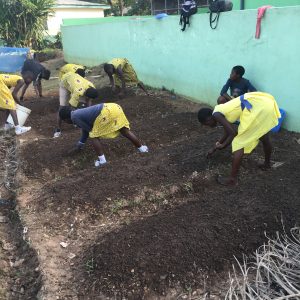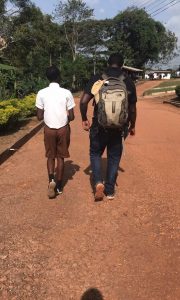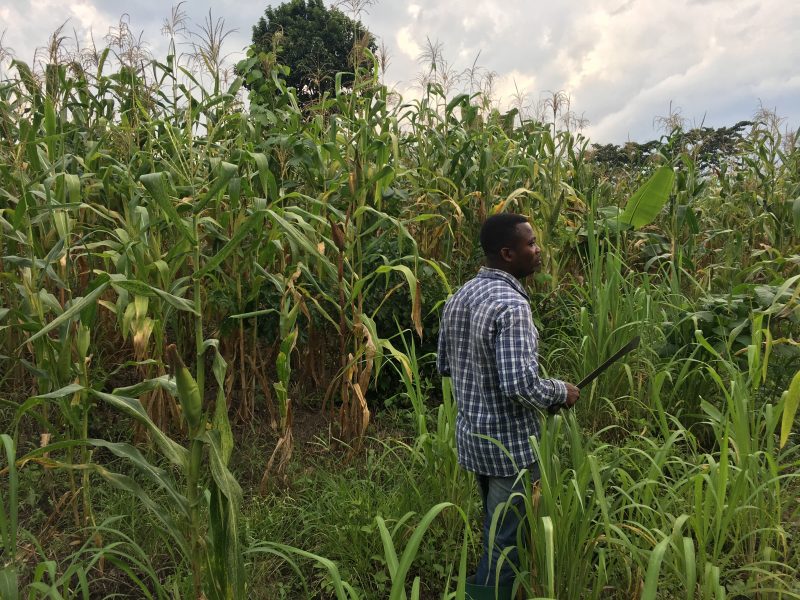I had just finished up teaching at the school for the day, lesson notes in hand and sweat on my brow, as the scorch of the Ghanaian sun sizzled on the back my neck. With the sounds of my students finishing up their closing prayer, I made my way back home. Just as I was unlocking my door to enter my room, I was approached by my neighbor. “Kwaku, 3te s3n?” [Eli, how are you?] (“Kwaku” is my local name). I reply with “Me ho y3, Na wo nso3?” [I am fine, and you?]. We exchange formalities and after some time, we began to talk about our day. As he continued, he asked me about the possibility of contacting my friends back in the US to see if they would donate money for a project that he was interested in doing. This was a request that I’ve received too often since being in Ghana. After my polite decline of his request, I expressed how my purpose in Ghana was not to bring money to benefit my community, but instead to use my agricultural knowledge and skills to work with the people of Akwadum. This perception of a need for foreign money and aid in order to develop is an underlying mindset that I have seen quite often here in Ghana. The idea that many have that development won’t happen without foreign aid stepping in and assisting. However, I don’t believe that to be true at all.
 In my opinion, it will take the innovation and entrepreneurship of the Ghanaian people to cause true sustainable development. Yes, foreign money can assist in that process, but it can’t be the end all be all. As Agricorps Fellows, our duty is not to go into our respective host communities to give money or even be the lone agent of change, instead, we are placed in the hopes of empowering communities to be their own agents of change, innovation, and development. We serve as, what we call “dot connectors” to our host communities; connecting local problems with local solutions. Contrary to belief, we don’t enter communities with the answers, nor is it possible to do so. Prior to arriving in Ghana, I had several ideas about how I could help the local people and radically change Akwadum. I soon realized that this is impossible without first listening and understand the problems and concerns of the individuals affected. I couldn’t just assume or tell them what they needed to further development, but I had to listen to what people want and what they need.
In my opinion, it will take the innovation and entrepreneurship of the Ghanaian people to cause true sustainable development. Yes, foreign money can assist in that process, but it can’t be the end all be all. As Agricorps Fellows, our duty is not to go into our respective host communities to give money or even be the lone agent of change, instead, we are placed in the hopes of empowering communities to be their own agents of change, innovation, and development. We serve as, what we call “dot connectors” to our host communities; connecting local problems with local solutions. Contrary to belief, we don’t enter communities with the answers, nor is it possible to do so. Prior to arriving in Ghana, I had several ideas about how I could help the local people and radically change Akwadum. I soon realized that this is impossible without first listening and understand the problems and concerns of the individuals affected. I couldn’t just assume or tell them what they needed to further development, but I had to listen to what people want and what they need.
Recently, the President of Ghana even expressed his concerns with Ghana’s dependence on foreign aid for development.  President Nana Akufo-Addo shared his thoughts of how he has a vision for Ghana to be a country that is no longer co-dependent on foreign aid, “only a country that frees itself from a mindset of dependence, of charity, and handout” will be successful. I agree with President Akufo-Addo. I believe that the true development my community needs will not be from the programs, events, and projects that I contribute to during my time here. Rather, may it be from the Form 1 student sitting in the 4-H meeting, that after his/her time in education, becomes an entrepreneur and an innovator; using their talents to serve and empower their community. Maybe it will be the young farmer that decides to begin a plant breeding program for improved varieties of cassava. Or maybe it’s the young teacher that is inspired to invest in their teaching skills and increase their quality of lessons to be more engaging and experiential.
President Nana Akufo-Addo shared his thoughts of how he has a vision for Ghana to be a country that is no longer co-dependent on foreign aid, “only a country that frees itself from a mindset of dependence, of charity, and handout” will be successful. I agree with President Akufo-Addo. I believe that the true development my community needs will not be from the programs, events, and projects that I contribute to during my time here. Rather, may it be from the Form 1 student sitting in the 4-H meeting, that after his/her time in education, becomes an entrepreneur and an innovator; using their talents to serve and empower their community. Maybe it will be the young farmer that decides to begin a plant breeding program for improved varieties of cassava. Or maybe it’s the young teacher that is inspired to invest in their teaching skills and increase their quality of lessons to be more engaging and experiential.
From my own experience, sustainable development isn’t birthed by a motivation of money, recognition, or delegation. Instead it’s initiated one’s inner fire that that is passionate about connecting with people, innovation, and entrepreneurship.
Eli Hugghis received a degree in Botany from Purdue University. Before becoming an AgriCorps Fellow, Eli was involved with MANRRS and worked with local high schools to establish Junior MANRRS clubs.


